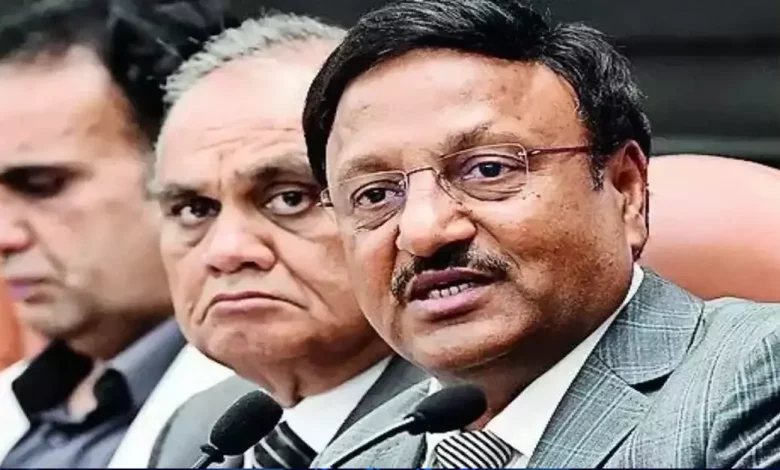CEC and Other ECs (Appointment, Conditions of Service and Term of Office) Bill
Syllabus- Polity and Governance [GS Paper-2]

Context- The Rajya Sabha recently passed the Chief Election Commissioner and Other Election Commissioners (Appointment, Conditions of Service and Term of Office) Bill.
Key Highlights
- The law governing the appointment of the Chief Election Commissioner (CEC) and the Election Commissioner (ECC).
- The Bill replaces the Electoral Commission (Conditions of Service and Business Transactions) Act 1991 and regulates the appointment, pay and dismissal of the Chief Election Commissioner (CEC) and election commissioners.
Key Highlights of the Bill
- Commission Appointment: The President appoints the CEC and EC on the recommendation of the Election Commission.
- The Selection Committee consists of the Prime Minister, a Union Cabinet Minister and the Leader of the Opposition/Leader of the largest opposition party in the Lok Sabha.
- The recommendations of the selection committee are valid even if there is a vacancy in that committee.
- The selection committee, led by the secretary of the committee, makes a proposal to the selection committee to form a five-member committee.
- The selection committee can also consider other people than those proposed by the search committee.
- Eligibility criteria: CEC and EC must:
(i) must be honest persons,
(ii) have knowledge and experience in administration and conducting elections and
(iii) be or have been the secretary of the board (etc.).
- Tenure and Re-appointment: The term of office of the members of the Election Committee shall be six years or until the age of 65 years, whichever occurs earlier. Committee members cannot be re-elected.
- If EY is appointed as CEC, the total term cannot exceed six years.
- Salary and Pension: Salary, allowances and other conditions of service of CEC and EK are equivalent to that of a Cabinet Secretary.
- Removal: The bill maintains the CEC and EC removal method defined in the Constitution.
- The CEC can be removed in the same way and for the same reasons as a judge of the Supreme Court.
- ECs can only be removed on the recommendation of the CEC. background
Article 324 of the Constitution:
- Article 324 states that the election commission consists of the chief election commissioner (CEC) and the number of election commissioners appointed by the president.
- The Election Commission of India (ECI) is responsible for preparing voter lists and conducting elections to parliament, state legislatures and the post of President and Vice President.
- The Constitution defines that the President appoints the KRK and the EC in accordance with the provisions of the Riigikogu Law.
Election Commissioners and Transaction of Business) Act, 1991:
- The law set the salaries of KVK and EY at the same level as a state judge.
- It did not anticipate the process of appointing them, which was still decided by the President.
March 2023 Supreme court Ruling (Anoop Baranwal v Union of India):
- The Supreme Court declared that the appointment of CEC and ECS should not be the exclusive task of the executive.
- The Court noted that the European Citizens’ Initiative should be independent of the executive supervision.
- This authorized an election process that will continue until Parliament approves the law.
- The Court of Auditors ordered the President to appoint a selection committee, based on a recommendation that includes:
(i) the Prime Minister,
(ii) the Leader of the Opposition in the Lok Sabha and
(iii) the Chief Justice of India.
Key Issues with the Bill
-
- Independence of the Electoral Commission: The government can control the electoral process of the Electoral Commission, which affects its independence.
- Board Monopoly: Acceptance of the selection committee’s recommendations despite a constitutional vacancy can effectively lead to a monopoly on the selection of candidates by board members.
- Government Influence: If the Cabinet Secretary understands the salary of the Government Commission and EY, it can lead to the influence imposed by the Government. That is in contrast to the salary of a state judge, which is set by law of the Riigikogu.
- Exclusion: CECs and ECs also perform police functions. Limiting these positions to senior bureaucrats may exclude other suitable candidates.
- Administrative independence of the Commission: The Goswami Committee recommended an independent secretariat for the ECI on the lines of the Lok Sabha, Rajya Sabha, Supreme Court and Supreme Courts, but the Bill of 2023 does not provide for this.
Suggestions made for composition of the Selection Committee
-
- Goswami Committee (1990):
- For CEC: Appointed by the president in consultation with the chief justice + the Leader of the opposition in the Lok Sabha (or the leader of the largest party in the Lok Sabha).
- For EC: Appointed by the president in consultation with the chief justice + the Leader of the opposition in the Lok Sabha (or the leader of the largest party in the Lok Sabha) + the CEC.
- The Constitution (70th Amendment) Bill 1990:
- Chairman of Rajya Sabha + Speaker of Lok Sabha + Leader of the Opposition (or the leader of the largest party) in Lok Sabha. The CEC was further made a part of the consultative process in the appointment of the Election Commissioners.
- National Commission to Review the Working of the Constitution Report (2002):
- Prime Minister + Leader of the Opposition in Lok Sabha + the Leader of the Opposition in Rajya Sabha + the Speaker of Lok Sabha + the Deputy Chairman of Rajya Sabha.
- Law Commission (2015):
- Prime Minister + the Leader of Opposition of Lok Sabha (or the leader of the largest opposition party in Lok Sabha) + the Chief Justice.
- Goswami Committee (1990):
- Supreme Court (2023):
-
- Prime Minister + Leader of Opposition in Lok Sabha (or leader of single largest opposition party in Lok Sabha) + Chief Justice.
Source: The Hindu
Practice question:
Q. What are the constitutional safeguards to ensure the independence and impartiality of the Election Commission of India? What are the limitations to the functioning of Election Commission of India?





.png)



